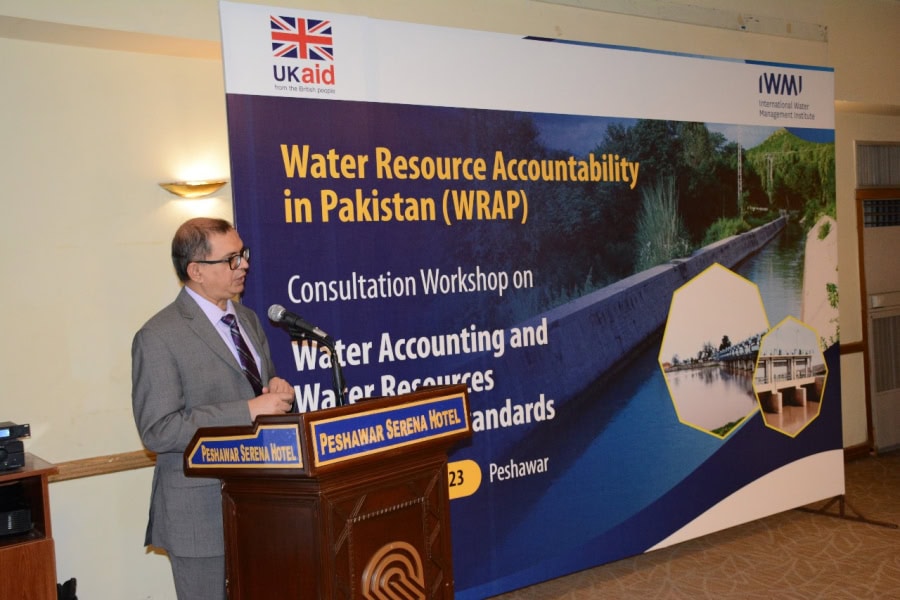PESHAWAR – Pakistan is grappling with critical water challenges that could have severe consequences for its economy and society. Recognizing the urgency of the situation, the International Water Management Institute (IWMI) Pakistan, with funding from UKaid, is spearheading the Water Resource Accountability in Pakistan (WRAP) Programme’s component 1: Climate Resilient Solutions for Improving Water Governance (CRS-IWaG). This program aims to bolster water resource management capabilities at the federal, provincial, and district levels.
Amidst Pakistan’s ongoing water management challenges, the lack of dependable annual water accounts detailing water availability (surface, groundwater, and rainfall) and their various uses (domestic, industrial, agricultural, and environmental) within the Indus Basin is glaring. Section-22 of the National Water Policy (NWP) 2018 underscores the need for a robust water information system to facilitate sustainable water resource planning and development.
In response to this imperative, IWMI Pakistan organized a consultation workshop on water accounting and water resources assessment standards to support the implementation of National Water Policy. Following a federal-level water accounting workshop held in March this year, a series of provincial-level workshops are now being held to better assess the status of water accounting mechanisms within each province and to enhance the capacity of provincial departments in this regard.

Dr. Mohsin Hafeez, Director, Water, Food & Ecosystems, IWMI welcomed the participants and provided an insightful overview of the WRAP programme and its component one which focuses on the climate resilient solutions for improving water governance (CRS-IWaG). Dr. Mohsin Hafeez said, “Let’s pave the way for a sustainable future, identifying hotspots and solutions for better water management in Khyber Pakhtunkhwa (KP), by unveiling a game-changing water accounting framework to track water sources, consumption, and availability. The workshop was attended by key stakeholders, policy makers, water experts and practitioners.

Speaking on this occasion, Caretaker Minister for Irrigation, Government of Khyber Pakhtunkhwa Engr. Ahmad Jan emphasized the significance of water, essential for both human and agriculture. He said, “Regrettably, our country lacks direction and policy in this vital area. Water quality remains a concern, with 90% of sampled water deemed unfit for consumption. Water is Life and it’s the perfect time to establish a robust system.” The minister said he is open to policy suggestions and pledges support for implementation, focusing on ownership and commitment. In this journey, everyone is a leader and an institution in themselves. Let’s work together for a brighter water future, the minister added.
Mr. M Tahir Orakzai, Secretary Irrigation, Government of Khyber Pakhtunkhwa highlighted the nationwide water accounting challenge, citing crucial missing data hindering framework implementation. Collaboration is key for water governance and improvement, and IWMI is leading the way.
Dr. Jahanzeb Masud Cheema, Water Resources Management Researcher, IWMI, extended a warm welcome to the participants of the workshop. He said, “Together, we aim to foster collaboration among departments, addressing water management at Federal and Provincial level. Embracing a holistic approach, we’re highlighting the missing pieces – groundwater and crop water-use. Let’s map the journey of water from source to destination.”
Kanwal Waqar, Gender and Youth Specialist Researcher, delved into the importance of gender diversity, inclusivity, equality, and equity in the WRAP Programme. She said gender equity and social inclusion (GESI) are integral to our efforts. We’re moving towards transformative approaches, recognizing that gender isn’t just male or female; it encompasses both. Females shouldn’t be excluded from decision-making; it’s not about capability but exposure. Empowering women is crucial; they suffer more due to water shortages. Through capacity-building and climate-smart technologies, we’re creating an enabling environment for female farmers.
The overarching objective of the consultation was to enhance water governance through climate-resilient solutions, implementing federal and provincial-level climate-smart interventions. These initiatives are geared towards strengthening national capacities for the implementation of such interventions, breaking through technical and non-technical barriers, and ensuring long-term sustainability. Furthermore, the programme will generate critical evidence for the implementation of national climate and water policies.
This effort by the International Water Management Institute (IWMI) focuses on optimizing water utilization and equitable distribution in priority areas, supporting the implementation of Water Acts. Additionally, the programme will disseminate key findings through various forums and engage in capacity development activities with government institutions and the private sector to advocate for the scaling up of technical interventions, thereby promoting diversity and inclusion through improved water governance.







